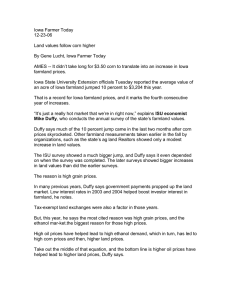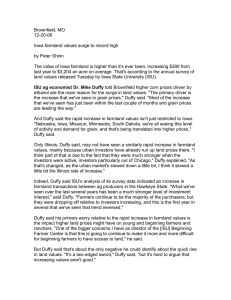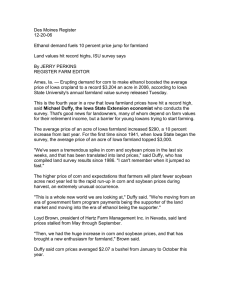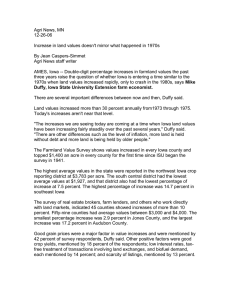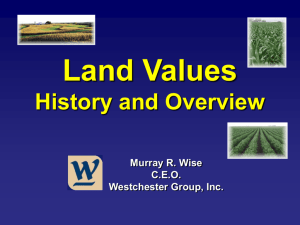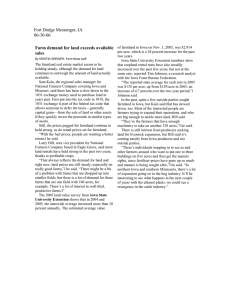Des Moines register 12-19-07 Farmland value's rise is greatest since 1976
advertisement
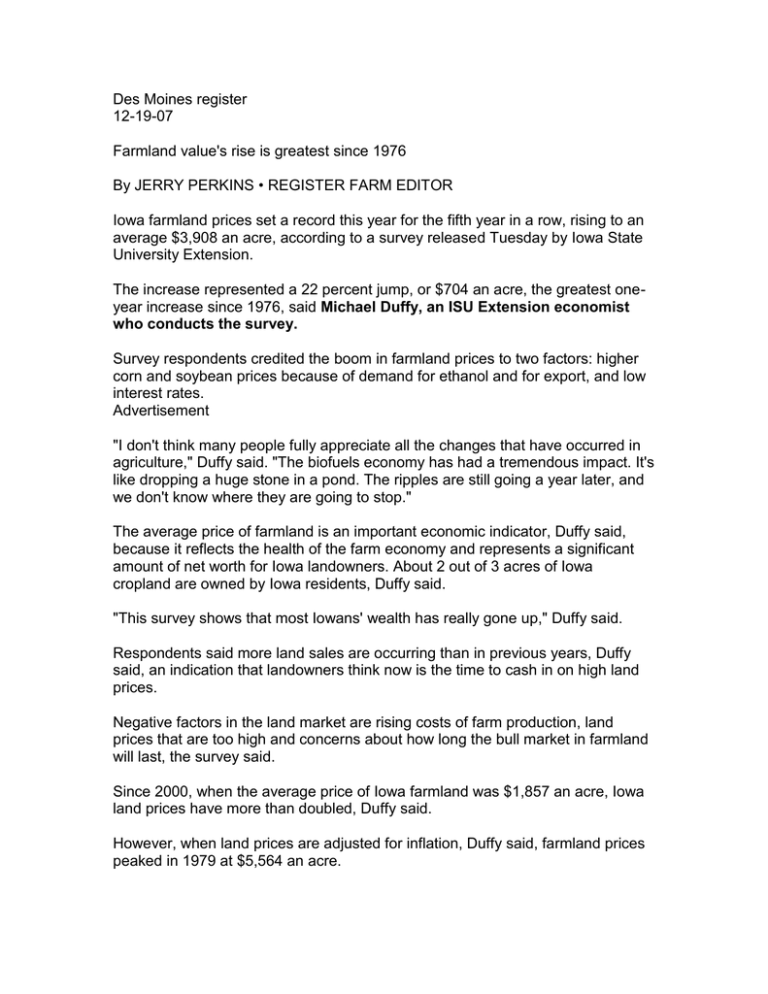
Des Moines register 12-19-07 Farmland value's rise is greatest since 1976 By JERRY PERKINS • REGISTER FARM EDITOR Iowa farmland prices set a record this year for the fifth year in a row, rising to an average $3,908 an acre, according to a survey released Tuesday by Iowa State University Extension. The increase represented a 22 percent jump, or $704 an acre, the greatest oneyear increase since 1976, said Michael Duffy, an ISU Extension economist who conducts the survey. Survey respondents credited the boom in farmland prices to two factors: higher corn and soybean prices because of demand for ethanol and for export, and low interest rates. Advertisement "I don't think many people fully appreciate all the changes that have occurred in agriculture," Duffy said. "The biofuels economy has had a tremendous impact. It's like dropping a huge stone in a pond. The ripples are still going a year later, and we don't know where they are going to stop." The average price of farmland is an important economic indicator, Duffy said, because it reflects the health of the farm economy and represents a significant amount of net worth for Iowa landowners. About 2 out of 3 acres of Iowa cropland are owned by Iowa residents, Duffy said. "This survey shows that most Iowans' wealth has really gone up," Duffy said. Respondents said more land sales are occurring than in previous years, Duffy said, an indication that landowners think now is the time to cash in on high land prices. Negative factors in the land market are rising costs of farm production, land prices that are too high and concerns about how long the bull market in farmland will last, the survey said. Since 2000, when the average price of Iowa farmland was $1,857 an acre, Iowa land prices have more than doubled, Duffy said. However, when land prices are adjusted for inflation, Duffy said, farmland prices peaked in 1979 at $5,564 an acre. In the 1973-75 period, farmland prices rose 33 percent a year, primarily because of an increase in exports from large corn, wheat and soybean purchases by the Soviet Union. "We'll see a strong land market in Iowa for at least five years," Duffy said. "We have seen a fundamental shift in demand for corn due to ethanol production. I don't think this demand will diminish in the near future. I don't see anything that can cause a downturn." Turmoil over home foreclosures has sparked worries, he said, and the volatile oil market could create uncertainty in the grain markets. Those who lived through the farm crisis of the early 1980s remember that farmland prices fell from $2,147 an acre in 1981 to $787 an acre in 1986, said Tom Huston, who is in his 50th year at Columbus Junction State Bank. Huston, 78, was superintendent of banking in Iowa during the farm crisis and oversaw the closing of 12 state-chartered banks because of insolvency. He said a recent sale of several parcels of Washington County farmland brought as much as $7,950 an acre. "That's the highest I've seen in my 50 years in banking," Huston said. "It's just wild." Land prices are reaching a point where they might not be justified by the revenue the land can generate, he said, one of the reasons for the farm crisis. "If the ethanol bubble doesn't last, then land prices could come back down," Huston said. One big difference between now and then, Huston said, is that interest rates are much lower now. Only 25 percent of Iowa farmland carries any debt, Duffy said, so most Iowa farmland would not be impacted by a rise in interest rates. Farm income this year will hit a record $87.5 billion, Duffy said, quoting a recent report from the U.S. Department of Agriculture. That's up 48 percent from a year ago. That means farmers have more money to spend on farmland, and the survey reflected that fact, he said. Sixty percent of farmland purchasers were farmers, about the same as last year, Duffy said. Thirty-five percent of farmland buyers were investors, and the rest were others or beginning farmers, also about the same as last year. The Iowa State survey, which has been conducted since 1941, fell in line with other farmland surveys released recently. The Federal Reserve Bank of Chicago's most recent survey of agricultural bankers showed that Iowa farmland prices rose 21 percent during the year ended Oct. 1. An association of Iowa farm real estate brokers that surveyed its members found that Iowa farmland prices increased 20.7 percent in the year that ended Sept. 1. Farm Editor Jerry Perkins can be reached at (515) 284-8456 or jperkins@dmreg.com
